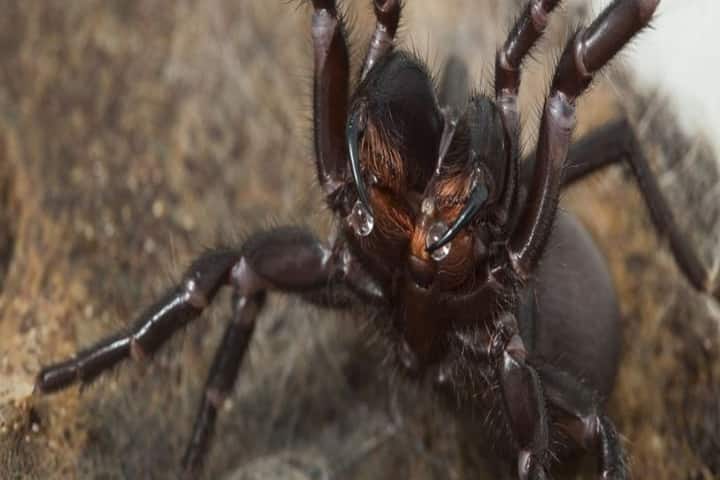

The Border Ranges funnel-web spider's venom composition depends on its mood and environment (Pic. Courtesy sciencealert.com)
Actions of all living beings are subject to the frame of mind they are in and their environment. This is true of Australian funnel-web spiders – the world’s deadliest – whose venom depends on its heart rate and defensiveness. As per a report in sciencealert.com these two factors play a decisive role in the proportion of chemicals these animals deliver.
Known to be the deadliest to all beings, including people, with their antivenom coming into being in 1981, there have been no human fatalities reported in Australia.
Elaborating on the need to study them, Linda Hernández Duran, a biologist in Australia’s James Cook University said: “Funnel-webs have the most complex venoms in the natural world, and they are valued for the therapeutics and natural bioinsecticides that are potentially hidden in their venom molecules. Knowing more about how they are produced is a step towards unlocking this potential.”
Scientists are studying this spider’s poison for a reason. Knowledge about its venom’s complex mixtures will help in pharmaceuticals, developing natural pesticides and antivenom.
According to a paper titled “Spider-Venom Peptides as Bioinsecticides” published in National Library of Medicine website, “…spiders are one of the most successful arthropod predators. Their venom has proven to be a rich source of hyperstable insecticidal mini-proteins that cause insect paralysis or lethality…”
Most of the studies on venom have not taken into account the physical state, environment and behaviour of the spider.
In the present study, four species of Australian funnel-web spiders, namely, Border Ranges, Darling Downs, Southern tree-dwelling and Sydney funnel-webs were made to go through some annoying tests. During these tests their huddling, defensive, climbing, and active behaviour were observed in three varied situations. These were predation when the animals were nudged with tweezers or puffs of air were blown at them. In the second they were made to hang out with another spider of the same species while during the last one a new territory was explored.
Scientists as per Duran “mapped [the spiders’] behaviour and measured their heart rate with a laser monitor to establish a proxy value for their metabolic rate. We then collected their venom and analysed it with a mass spectrometer.”
Research results showed that for three species there was no connection in their conduct and heart rate and the make-up of their poison. The only exception was Border Ranges funnel-web – higher heart rate and defensiveness was linked with different venom composition.
This is accompanied with increase in metabolic rate to produce venom; reduced movement when threatened; changes in number of bites; change in venom quality; and frightening the perceived enemy without biting.
Summing up the study which was published in PLOS ONE, Duran remarked: “We showed for the first time how specific venom components are associated with particular behavioural and physiological variables and demonstrated that these relationships are context-dependent. We gained some valuable insights for further exploration and understanding of the ecological role of venom.”
India and Australia have undertaken the first science and technology project arrangement to improve the…
The eighth edition of India-France Joint Military Exercise Shakti-VIII concluded on Thursday at Camp Larzac,…
As Prime Minister Narendra Modi has been conferred the national honour of Ghana, Officer of…
External Affairs Minister S Jaishankar held a meeting with FBI Director Kash Patel in Washington…
US State Department Deputy Spokesperson Mignon Houston on Wednesday (local time) said that India is…
India and Ghana signed four Memoranda of Understanding (MoUs) on Wednesday to strengthen bilateral cooperation…